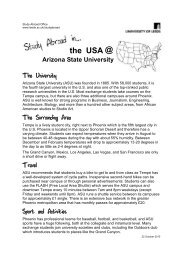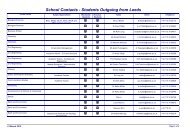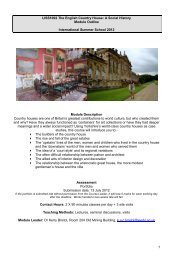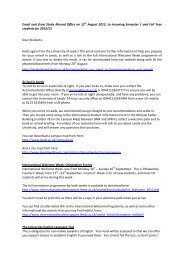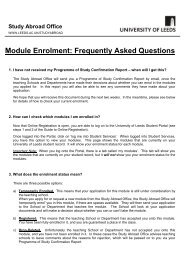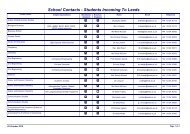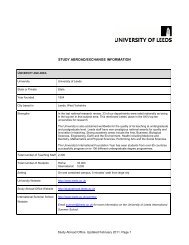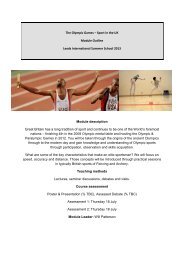Get Ready to Go - Study Abroad - University of Leeds
Get Ready to Go - Study Abroad - University of Leeds
Get Ready to Go - Study Abroad - University of Leeds
Create successful ePaper yourself
Turn your PDF publications into a flip-book with our unique Google optimized e-Paper software.
Differences <strong>to</strong> Expect at your Host Institution<br />
One <strong>of</strong> the reasons many students decide <strong>to</strong> study abroad is <strong>to</strong> experience a different culture and academic<br />
learning environment. Many students spend a considerable amount <strong>of</strong> time preparing for their studies overseas<br />
although this is <strong>of</strong>ten spent on the practical arrangements and <strong>of</strong>ten academic and university differences can be<br />
overlooked.<br />
Recent feedback from past study abroad students has shown the differences in university systems and academic<br />
teaching is an area where they felt least prepared so it is advised you consider some <strong>of</strong> the differences you may<br />
experience before you move overseas so it is less <strong>of</strong> a shock when you arrive.<br />
The <strong>University</strong> <strong>of</strong> <strong>Leeds</strong> has over 250 exchange partners so the staff in the <strong>Study</strong> <strong>Abroad</strong> Office and your school<br />
<strong>Study</strong> <strong>Abroad</strong> Coordina<strong>to</strong>r can not be expected <strong>to</strong> have detailed knowledge <strong>of</strong> the systems used by all institutions.<br />
It is a good idea <strong>to</strong> seek advice from past study abroad students or current exchange students in <strong>Leeds</strong> (from your<br />
host institution) about the way things work. See the information on page 9 about networking with peers.<br />
Below are just a few <strong>of</strong> the areas which may differ considerably from the <strong>University</strong> <strong>of</strong> <strong>Leeds</strong>.<br />
<strong>University</strong> Registration<br />
<strong>University</strong> registration procedures at host institutions vary widely. Some will have a similar online system <strong>to</strong> <strong>Leeds</strong><br />
which you can complete prior <strong>to</strong> departure, at other institutions you will be expected on arrival <strong>to</strong> queue up<br />
(sometimes for hours) with the home students at the admission/registration <strong>of</strong>fice.<br />
Registration at your host institution is an important procedure which you must undertake so spend some time<br />
before you leave finding out how you go about this process.<br />
Module Enrolment/ Exam registration:<br />
Modules may be called courses, units or classes at the host institution.<br />
Some host institutions don’t need you <strong>to</strong> <strong>of</strong>ficially enrol on<strong>to</strong> modules, others will need you <strong>to</strong> add/drop modules by<br />
a certain date in a similar way <strong>to</strong> <strong>Leeds</strong>. Try <strong>to</strong> find out what happens at your host institution.<br />
At some institutions you may be required <strong>to</strong> register for exams 2- 4 weeks prior <strong>to</strong> the exam date. This is a very<br />
different process than the one at <strong>Leeds</strong> and not a system you would au<strong>to</strong>matically know about or be informed<br />
about. As you can imagine there could be serious consequences <strong>of</strong> not registering for an exam and not obtaining<br />
a mark for a module you had followed for a semester or a year. You should enquire about this during the<br />
orientation period at your host institution.<br />
Network with past study abroad and current exchange students and ask them about module/exam enrolment.<br />
Teaching Style<br />
Teaching styles vary considerably across the <strong>University</strong>'s partner institutions. In some cases, especially in Europe,<br />
students will be expected <strong>to</strong> direct their own studies even more so than at <strong>Leeds</strong>. Most teaching will be done in<br />
large lectures with less opportunity for interaction with the academic staff. On the contrary, there is a strong culture<br />
<strong>of</strong> continuous assessment in North America and you will be expected <strong>to</strong> hand in assignments and take tests on a<br />
more regular basis. In North America, attendance <strong>of</strong> lectures is usually required <strong>to</strong> pass a module. You will also<br />
encounter different study cultures among students when studying abroad. It is strongly advised that you network<br />
with study abroad students from or at your host institution <strong>to</strong> find out more about these differences.<br />
30



